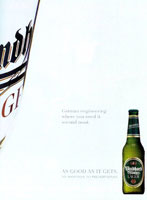
Top stories






More news



 The pay-off line which borrows from: "German engineering where you need it most...", is extremely well known. But I clearly remember the media-driven spat between Namibian Breweries and SAB, which was essentially about 'real' versus 'fake' and all the issues (e.g. use of additives; preservatives; ingredients; brewing time; colour, etc.) that related to the debate.
The pay-off line which borrows from: "German engineering where you need it most...", is extremely well known. But I clearly remember the media-driven spat between Namibian Breweries and SAB, which was essentially about 'real' versus 'fake' and all the issues (e.g. use of additives; preservatives; ingredients; brewing time; colour, etc.) that related to the debate.
One of the cornerstones of Windhoek's USP (or Unique Selling Proposition) and its marketing campaign, is the 1516 "Reinheitsgebot" (purity law), which is proudly displayed on the front of its labels. This theme is elaborated upon on the label with the phrase: "Carefully brewed in the slow, traditional way, using natural ingredients only...".
Whilst Nam Breweries undoubtedly have a well-informed strategy, I wonder whether the notions of 'traditional'/'slow brewed' and 'engineering' are not somewhat uneasy bedfellows. I previously came away from the "Windhoek" brew with the feeling that it was decidedly 'low tech' in a romantic, micro-brewery, sort of way, which reinforced the notions of honest, simple, personal, emotional and rooted ('local is lekker'), all of which fit snugly under the umbrella of 'authenticity' as defined by David Boyle (2003).
After all, how high-tech can 'barley', 'hops' and 'water' be? And, how much 'engineering' did the brew-masters have at their disposal in 1516, yet they produced the 'blueprint' for a brew that still makes tastebuds revel in delight nearly 500 years later? Furthermore, the decision to communicate 'high-tech' is an interesting one, given that many other brands are at pains to emphasise how 'low-tech' they are, e.g. Jack Daniel's, "Whiskey made as our fathers made it for seven generations".
But, on reflection, the new pay-off line might be the expression of a different strategic intent, altogether. Using an adapted, but still instantaneously recognizable pay-off line derived from a Luxury German Car Maker and placing the Windhoek Lager brand on the same footing, conveys the meaning that it is sophisticated ('German engineered'), albeit a real and rooted brew targeted at those consumers who like to see themselves in that 'hybrid' light.
The combination of both 'high tech' and 'natural/home-grown' in the ad may be a clever move, because the claim that it is steeped in a tradition of authenticity and the use of natural ingredients may no longer be enough to distinguish a brand, as other brewers have cottoned-on.
As Boyle (2003), notes, "the New Realists' strength of feeling has... been having an effect on... food conglomerates... like the micro-breweries Mountain Red Lager and Elk Mountain amber ale, launched by the big American beer brands, using exactly the same hops" (p. 84). But, perhaps the strategy of combining the 'old' and the 'high-tech' may turn out to be a double-edged sword. Again, in the words of Boyle (2003), "...the truth is that people's distrust of... manipulation of symbols on advertisements - will soon undermine any long-term messages. If your products are rooted in specific geographical communities or in unusually powerful principles or ethical standards, then there are stories you can tell about them. And stories can get across complex truths in a memorable way better than almost anything else" (p. 274). Many of these distinguishing features seem to pertain in the case of Windhoek Lager.
Perhaps Jack Daniels and other brands which emphasise stories, geographic context and authenticity, are on the right track after all.
Sources: Boyle, D. (2003): Authenticity: Brands, Fakes, Spin and the Lust for Real Life. London: Flamingo.